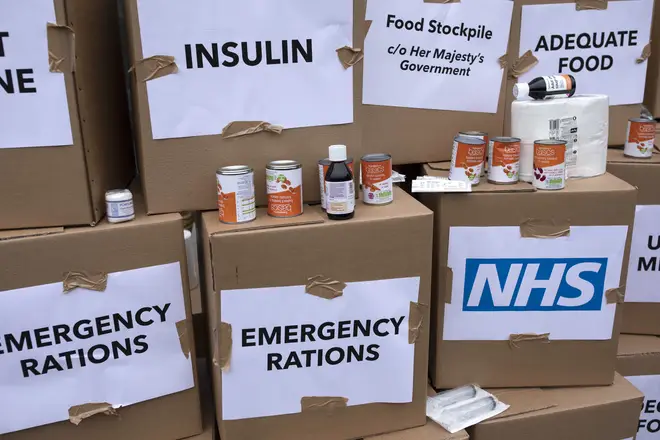
Richard Spurr 1am - 4am
3 August 2020, 23:34

The government has urged pharmaceutical firms to stockpile six weeks' worth of drugs due to potential disruption caused by the end of the Brexit transition period.
Medicine users and drug firms need protecting in the event that supply chains, already stretched by the coronavirus pandemic, face further delays and obstacles at the end of the year, the government has warned.
The Department of Health and Social Care (DHSC) has written to suppliers advising them to prioritise boosting their reserves ahead of the Brexit transition period ending.
Published online on Monday, the letter stresses that ministers will not be asking for an extension to the transition period past 31 December, despite the disruption caused by the Covid-19 outbreak.
Some fear the coronavirus pandemic has decimated some medical supplies and that a disorderly exit from the European Union without a trade deal could cause significant disruption to the UK's stocks.
Suppliers have been advised to plan for all scenarios, including reduced traffic flow at short crossings such as between Calais and Dunkirk, or Dover and Folkestone.
Read more: Pro-Brexit and right-leaning academics ‘forced to hide views’ and censor teaching
Read more: 'Disorderly Brexit' and coronavirus threaten UK's food security, MPs claim

Grant Shapps "wouldn't put money" on agreeing Brexit deal
"We recognise that global supply chains are under significant pressure, exacerbated by recent events with Covid-19," the letter says.
"However, we encourage companies to make stockpiling a key part of contingency plans, and ask industry, where possible, to stockpile to a target level of six weeks' total stock on UK soil."
The government's advice follows continued uncertainty over whether the UK will successfully strike an agreement with the bloc on a future relationship before time runs out at the end of the year.
Brussels' chief negotiator Michel Barnier said last month that London's position made the prospects of a deal "at this point unlikely."
The British Medical Association (BMA), the trade union representing doctors, warned the stockpile is "at best a short-term solution."
Deputy council chairman Dr David Wrigley said: "With the transition period only months away and at the height of what will be an undoubtedly difficult winter, this is incredibly concerning.
"The BMA has consistently warned that a no-deal Brexit could have a potentially devastating impact on the NHS and consequently the health of the nation. Now, more than ever, it is absolutely crucial that the government secure a relationship that protects the future health of this country."
Read more: Britain must 'face the possibility' of a no-deal Brexit, says chief negotiator
Read more: Post-Brexit exports will cause 'significant challenges' for British firms, report

Boris Johnson: Australian-style Brexit deal is a very good option
Meanwhile, plans to install a "border in Kent" will create "more red tape" for businesses, the logistics industry has warned.
The Department for Transport is consulting on a series of measures as part of Operation Brock contingency planning for possible disruption to cross-Channel trade when the transition period ends.
It is proposing to require hauliers driving to the Port of Dover or Eurotunnel, Folkestone to be in possession of a Kent Access Permit (KAP).
Chris Yarsley, policy manager for road infrastructure at trade association Logistics UK, said: "It is disappointing to see that the Government is expecting significant friction at the border with the EU, after the logistics industry had been given previous reassurances that friction would be minimised.
"Our members are dismayed that the onus for compliance will be placed on drivers themselves, leaving them personally liable for a fine if they do not comply with the new rules.
"The current proposals create an internal UK border by introducing Kent Access Permits, adding more red tape to the work which hauliers will be obliged to comply with."
KAPs would be issued to drivers who have received a green or amber result from the online Smart Freight system, which is being developed by the Government in a bid to ensure goods are ready to cross the border before journeys begin.
Each KAP would be valid for 24 hours to cover a single trip.
Drivers found heading to Dover or Folkestone without one face being hit with a £300 fine by officers from the police or Driver and Vehicle Standards Agency.
Transport Secretary Grant Shapps said enabling goods to continue to flow smoothly is an "underlying objective" in the Government's negotiations with the EU about their future relationship.
He went on: "There is at least initially a risk of some additional friction at the border - notably if goods arrive without having completed the necessary customs and other processes.
"It is thus important that we put in place plans both to minimise the risk of disruption and to mitigate its impact should it occur."